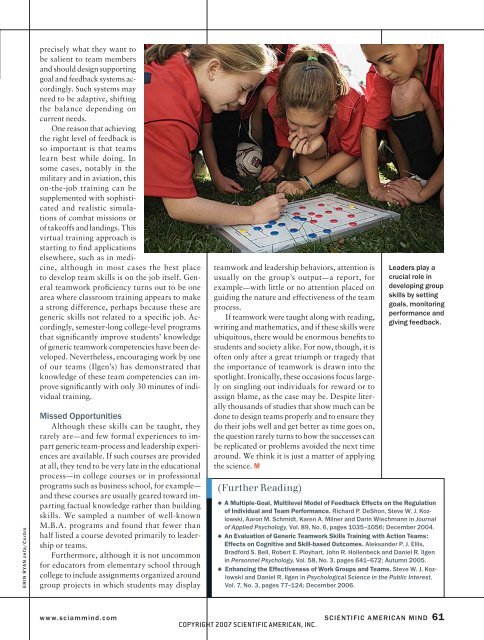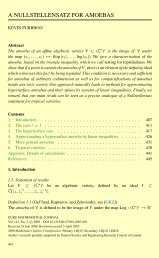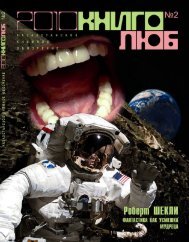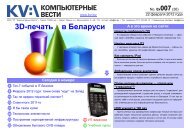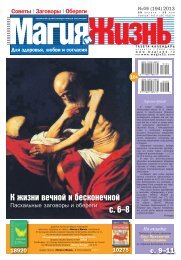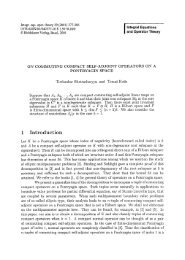Scientific American Mind-June/July 2007
Scientific American Mind-June/July 2007
Scientific American Mind-June/July 2007
Create successful ePaper yourself
Turn your PDF publications into a flip-book with our unique Google optimized e-Paper software.
ERIN RYAN zefa/Corbis<br />
precisely what they want to<br />
be salient to team members<br />
and should design supporting<br />
goal and feedback systems accordingly.<br />
Such systems may<br />
need to be adaptive, shifting<br />
the balance depending on<br />
current needs.<br />
One reason that achieving<br />
the right level of feedback is<br />
so important is that teams<br />
learn best while doing. In<br />
some cases, notably in the<br />
military and in aviation, this<br />
on-the-job training can be<br />
supplemented with sophisticated<br />
and realistic simulations<br />
of combat missions or<br />
of takeoffs and landings. This<br />
virtual training approach is<br />
starting to fi nd applications<br />
elsewhere, such as in medicine,<br />
although in most cases the best place<br />
to develop team skills is on the job itself. General<br />
teamwork profi ciency turns out to be one<br />
area where classroom training appears to make<br />
a strong difference, perhaps because these are<br />
generic skills not related to a specifi c job. Accordingly,<br />
semester-long college-level programs<br />
that signifi cantly improve students’ knowledge<br />
of generic teamwork competencies have been developed.<br />
Nevertheless, encouraging work by one<br />
of our teams (Ilgen’s) has demonstrated that<br />
knowledge of these team competencies can improve<br />
signifi cantly with only 30 minutes of individual<br />
training.<br />
Missed Opportunities<br />
Although these skills can be taught, they<br />
rarely are—and few formal experiences to impart<br />
generic team-process and leadership experiences<br />
are available. If such courses are provided<br />
at all, they tend to be very late in the educational<br />
process—in college courses or in professional<br />
programs such as business school, for example—<br />
and these courses are usually geared toward imparting<br />
factual knowledge rather than building<br />
skills. We sampled a number of well-known<br />
M.B.A. programs and found that fewer than<br />
half listed a course devoted primarily to leadership<br />
or teams.<br />
Furthermore, although it is not uncommon<br />
for educators from elementary school through<br />
college to include assignments organized around<br />
group projects in which students may display<br />
teamwork and leadership behaviors, attention is<br />
usually on the group’s output—a report, for<br />
example—with little or no attention placed on<br />
guiding the nature and effectiveness of the team<br />
process.<br />
If teamwork were taught along with reading,<br />
writing and mathematics, and if these skills were<br />
ubiquitous, there would be enormous benefi ts to<br />
students and society alike. For now, though, it is<br />
often only after a great triumph or tragedy that<br />
the importance of teamwork is drawn into the<br />
spotlight. Ironically, these occasions focus largely<br />
on singling out individuals for reward or to<br />
assign blame, as the case may be. Despite literally<br />
thousands of studies that show much can be<br />
done to design teams properly and to ensure they<br />
do their jobs well and get better as time goes on,<br />
the question rarely turns to how the successes can<br />
be replicated or problems avoided the next time<br />
around. We think it is just a matter of applying<br />
the science. M<br />
(Further Reading)<br />
Leaders play a<br />
crucial role in<br />
developing group<br />
skills by setting<br />
goals, monitoring<br />
performance and<br />
giving feedback.<br />
◆ A Multiple-Goal, Multilevel Model of Feedback Effects on the Regulation<br />
of Individual and Team Performance. Richard P. DeShon, Steve W. J. Kozlowski,<br />
Aaron M. Schmidt, Karen A. Milner and Darin Wiechmann in Journal<br />
of Applied Psychology, Vol. 89, No. 6, pages 1035–1056; December 2004.<br />
◆ An Evaluation of Generic Teamwork Skills Training with Action Teams:<br />
Effects on Cognitive and Skill-based Outcomes. Aleksander P. J. Ellis,<br />
Bradford S. Bell, Robert E. Ployhart, John R. Hollenbeck and Daniel R. Ilgen<br />
in Personnel Psychology, Vol. 58, No. 3, pages 641–672; Autumn 2005.<br />
◆ Enhancing the Effectiveness of Work Groups and Teams. Steve W. J. Kozlowski<br />
and Daniel R. Ilgen in Psychological Science in the Public Interest,<br />
Vol. 7, No. 3, pages 77–124; December 2006.<br />
www.sciammind.com SCIENTIFIC AMERICAN MIND 61<br />
COPYRIGHT <strong>2007</strong> SCIENTIFIC AMERICAN, INC.


